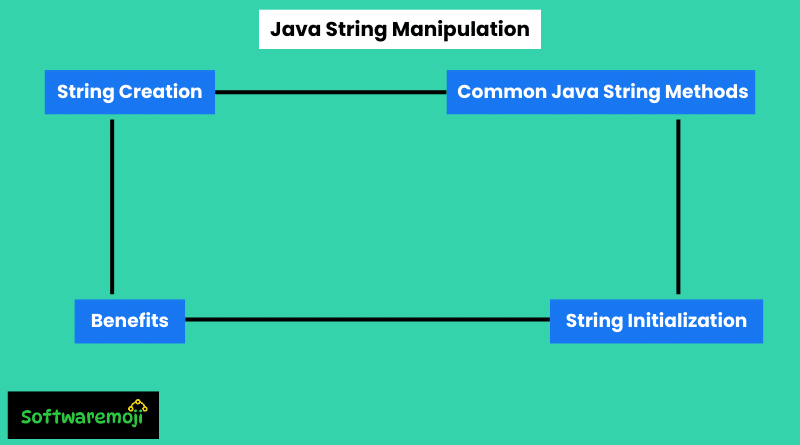
Java String Manipulation.
➡️Mastering Java String Manipulation is essential for effective text processing in any Java application.
➡️Learn how to use Java String methods like substring(), replace(), and split() for clean and efficient coding.
➡️Java StringBuilder and StringBuffer offer powerful tools for mutable string manipulation in Java.
➡️Improve your Java performance by understanding the difference between immutable Strings and mutable alternatives.
➡️Explore real-world examples of Java String manipulation for data parsing and formatting.
➡️String handling in Java plays a key role in input validation, data conversion, and pattern matching.
➡️Discover advanced Java String techniques like regular expressions and pattern matching with Pattern and Matcher.
➡️Optimize your Java code by choosing the right string manipulation techniques for your use case.
➡️Java developers must understand String immutability and how it affects memory and performance.
➡️From simple concatenation to complex regex processing, Java String manipulation is a must-know skill.
👉Tutorial-1:–How to Compare Two Strings in Java
👉Tutorial-2:–Java HashMap
🔥What are Strings in Java?
A String in Java is a sequence of characters, widely used in programming for storing and manipulating text data. Java provides a built-in String class in the java.lang package, making it easy to work with strings efficiently.
🔥 Why Use Strings in Java?
Strings play a crucial role in programming, especially in:
✅ Handling user input and output.
✅ Processing text-based data.
✅ Working with file I/O.
✅ Manipulating URLs, JSON, and XML.
Since Java Strings are immutable (cannot be changed once created), they are optimized for performance and security.
🔥 String Creation & Initialization:
Java String Manipulation is a core concept in Java programming that allows developers to modify, compare, split, and extract data from strings efficiently. Mastering string methods like substring(), replace(), split(), toLowerCase(), and trim() helps optimize text processing in SEO-related applications such as URL rewriting, meta tag creation, and keyword extraction.
There are two ways to create strings in Java:
1️⃣ Using String Literal (Recommended):
javaString str1 = "JavaProgramming";
➡ This method is efficient as Java optimizes memory using the String Constant Pool.
2️⃣ Using new Keyword:
javaString str2 = new String("JavaProgramming");
➡ This method creates a new object in heap memory, even if the same string exists.
Using StringBuilder or StringBuffer improves performance during heavy string operations. For SEO tools and web content management systems, Java’s powerful string manipulation capabilities enable dynamic content generation, enhancing search engine visibility. Learn and implement Java String functions to build faster, SEO-optimized Java applications.
🔥 Common Java String Methods (With Examples):
1️⃣ Concatenation (Joining Strings):
javaString first = "Hello";
String second = "World";
String result = first + " " + second; // Using + Operator
System.out.println(result); // Output: Hello World
OR
javaString result2 = first.concat(second); // Using concat() method
System.out.println(result2); // Output: HelloWorld
2️⃣ Finding String Length:
javaString text = "Java";
System.out.println(text.length()); // Output: 4
3️⃣ Accessing Characters (charAt Method):
javaSystem.out.println(text.charAt(2)); // Output: v
4️⃣ Finding Index of a Character (indexOf):
javaSystem.out.println(text.indexOf('v')); // Output: 2
5️⃣ String Comparison (compareTo & equals):
javaString str1 = "Java";
String str2 = "JAVA";
System.out.println(str1.equals(str2)); // Output: false
System.out.println(str1.equalsIgnoreCase(str2)); // Output: true
6️⃣ Checking Substring Presence (contains):
javaSystem.out.println(str1.contains("av")); // Output: true
7️⃣ Changing Case (toLowerCase & toUpperCase):
javaSystem.out.println(str1.toUpperCase()); // Output: JAVA
System.out.println(str1.toLowerCase()); // Output: java
8️⃣ Replacing Text (replace):
javaString sentence = "Java is great!";
System.out.println(sentence.replace("great", "awesome"));
// Output: Java is awesome!
9️⃣ Checking Start & End (startsWith, endsWith):
javaSystem.out.println(sentence.startsWith("Java")); // Output: true
System.out.println(sentence.endsWith("great!")); // Output: true
🔥Benefits of Java String Manipulation:-
Java String methods help in:
✔ Efficiently handling user-generated content
✔ Cleaning and optimizing URLs & meta tags
✔ Processing search queries & keywords
✔ Creating dynamic friendly content
By mastering Java String manipulation, you can optimize your search engines & user experience effectively.
🔥Final Thoughts:-
Java Strings are powerful tools for text processing. Understanding and utilizing the right methods ensures optimized performance and friendly applications. Keep practicing and enhance your Java skills! 🚀
